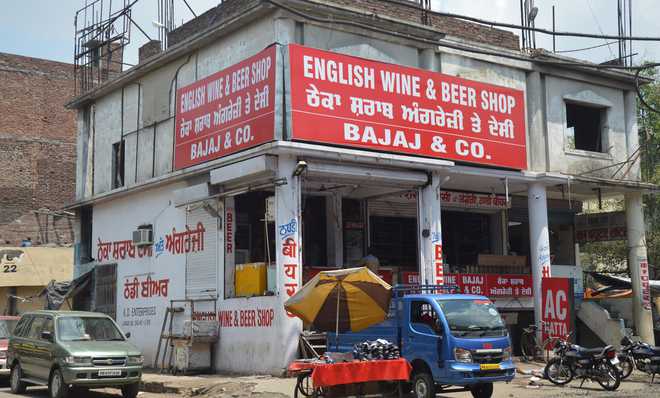
Excise Department expects to collect Rs 5,150 crore by the end of financial year, as against Rs 4,400 crore collected during 2016-17.
Tribune News Service
Chandigarh, March 13
The Punjab Cabinet on Tuesday approved the new Excise Policy for the state, with the aim of breaking the monopoly in the liquor business and keeping liquor prices under control, by slashing the group size from Rs 40 crore to Rs 5 crore, thus increasing the number of groups from the current 84 to around 700 in the next fiscal.
Besides, to streamline the business, the number of liquor vends will be reduced from 5,850 to 5,700 (approximately).
Allotment is proposed to be done through draw of lots to bring greater transparency under the new Excise Policy, which has been drawn out in consultation with various stakeholders and is focused on breaking the monopoly in the business.
The Excise Policy for 2018-19 got the cabinet nod today at a meeting chaired by Chief Minister Captain Amarinder Singh.
The government is hoping to earn Rs 6,000 crore during the next fiscal from the liquor business under the new policy, said an official spokesperson after the cabinet meeting.
For the current fiscal, the Excise Department expects to collect Rs 5,150 crore by the end of financial year, as against Rs 4,400 crore collected during 2016-17.
The CM has directed the Excise Department to strictly monitor the policy implementation to ensure that there is no deviation in the collection of the projected revenues, according to the spokesperson.
The group size, under the new Policy, has been kept very small at Rs 5 crore only -- with variation up to 25% to enable sufficient competition in the market, leading to reduced prices, said the spokesperson. The rate of application has been fixed at Rs 18,000, including GST, if any.
Further, under the new policy, the quota of PML has been reduced from 8.44 crore PLs to 5.78 crore PLs (-32%), of IMFL from 3.71 crore PL to 2.48 crores PLs (-33%) and of beer from 3.22 crore BLs to 2.57 crore BL (-20%) under the Minimum Guaranteed Quota.
Each licence will be granted on a Minimum Guaranteed revenue basis, which will consist of fixed licence fee and excise duties/levies chargeable on minimum guaranteed quota. The licensee will be liable to pay such minimum guaranteed revenue even if he does not lift the quota allocated to his licence. Settlement will be on monthly basis, which will also help in removing the supply of excess liquor to bootleggers.
The policy also provides that leftover excess quota of 2017-18 be carried forwarded in Minimum Guaranteed Quota of 2018-19, subject to payment of Excise Duty for 2018-19.
Under the provisions of the policy, a fixed licence fee will be chargeable at the time of grant of licence. This will be fixed by the Collector-cum-DETC depending upon the quota of the group and location of vends.
Also, Excise Duty has been levied instead of Licence Fee, Special Development Fee, Extra Licence Fee as part of the new policy.
The rates of Excise Duty on PML, IMFL and beer have been fixed at Rs 318 per PL, Rs 348 per PL and Rs 52 per BL, respectively, from wholesaler to retail stage.
Similarly, Excise Duty on PML has been levied @ Rs 35 per PL and on beer, Rs 60 per BL for strong beer and Rs 57 for light beer. On IMFL liquor, Excise Duty ranging from Rs 84 to Rs 390 has been charged depending on the EDP of the brand.
Under the new policy, the licensee can interchange upto 5% of his quota from PML to IMFL and from IMFL to PML, as per requirement. Similarly, he can also get converted 10% quota of PML to IMFL, subject to certain conditions.
The EDP of PML has been fixed at Rs 254 per case, as against Rs 240 per case fixed last year. On the suggestion of the Chief Minister, the Cabinet decided to retain the ratio of fixed:open quota of PML at 30:70 in order to encourage local distilleries from whom the licensed vends are obligated to pick up their quota.
However, Excise Incidence on all kinds of liquor has been suitably increased so as to secure government revenue and to prevent market prices from rising. Further, all L-2 licensees have been made eligible for grant of L-1 licence and it will be a pre-requisite to have L-2 licence in the district where L-1 licence is sought.
Abolition of Uchanti system and charging of only minimum retail prices of liquor to retail licensee for functions to be held in marriage palaces/banquet halls are among the other features of the new policy.
Meanwhile, it has been proposed by the Excise & Taxation Department that instead of levying Cow Cess on per bottle basis in urban areas only (as has been done by some MCs), special license fee @ Rs 5 per PL on PML and IMFL may be levied both in urban areas and rural areas so that equal rates of liquor are maintained in the market. The fund so collected will be used for upkeep of Cows in urban areas. Similarly, the fund will be used for the welfare of livestock in rural areas alongwith on education and health services, Swachhta Abhiyan. The proceeds of the special licence fee will be deposited in the Treasury and the Department of Finance will transfer requisite funds to the concerned departments.



























